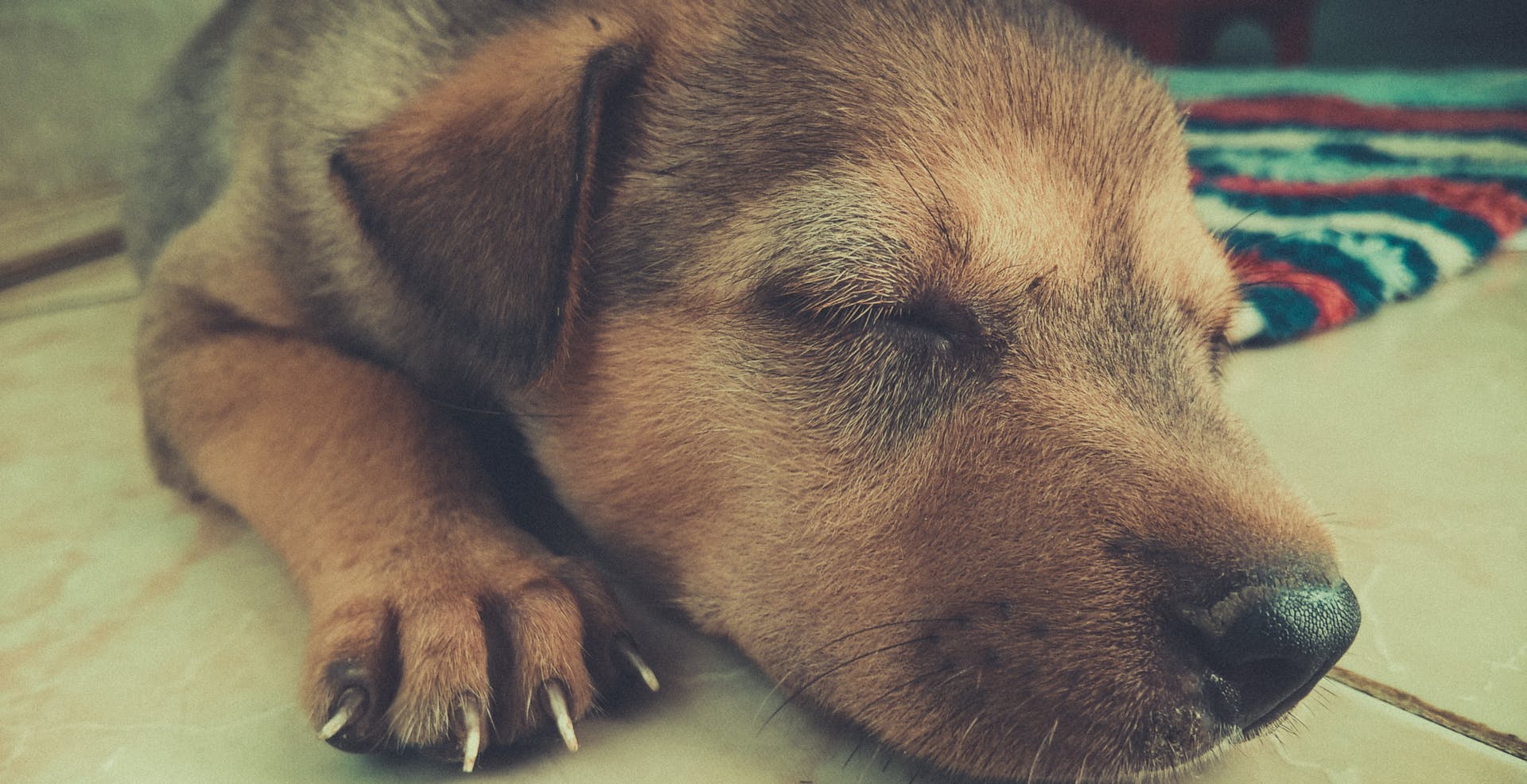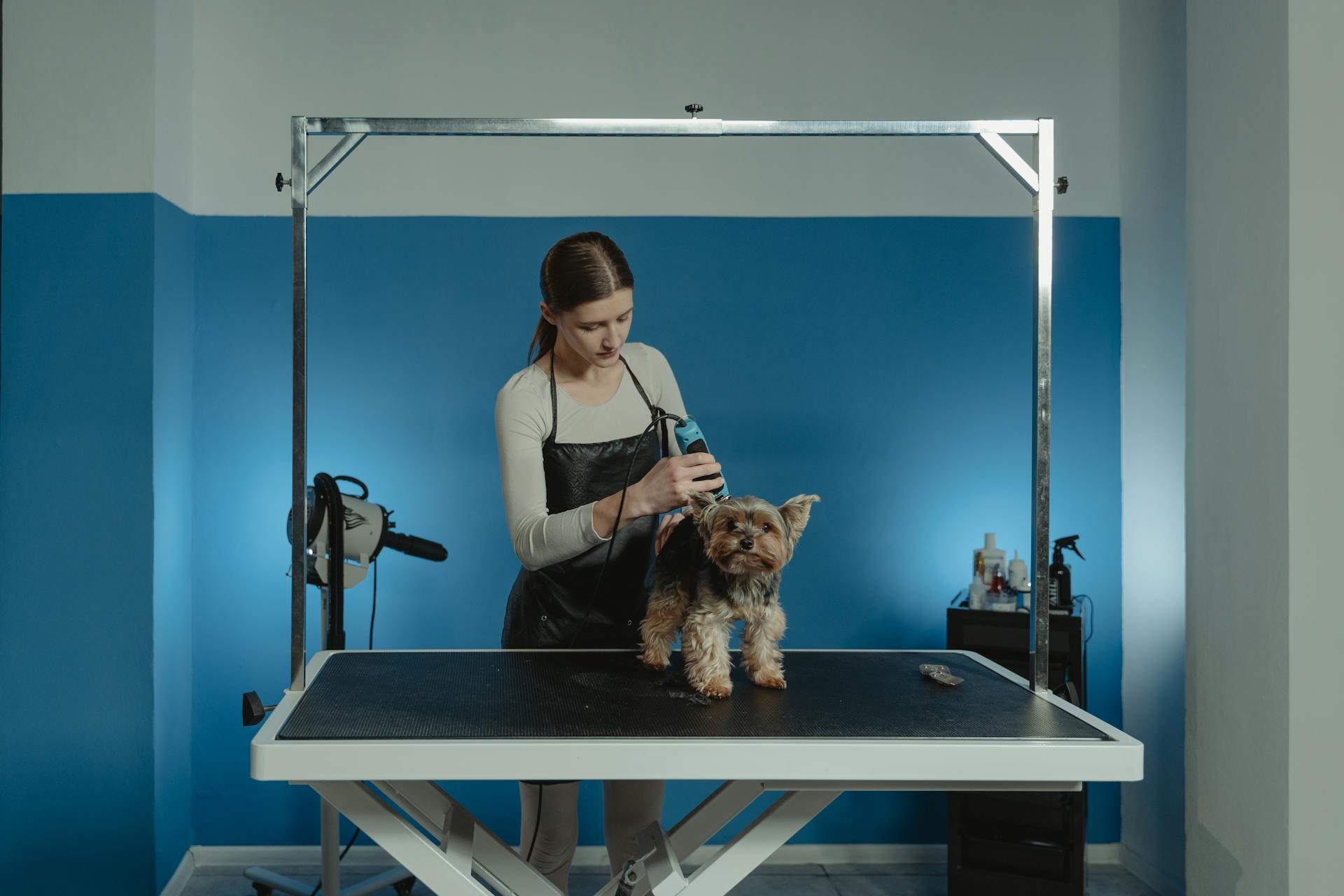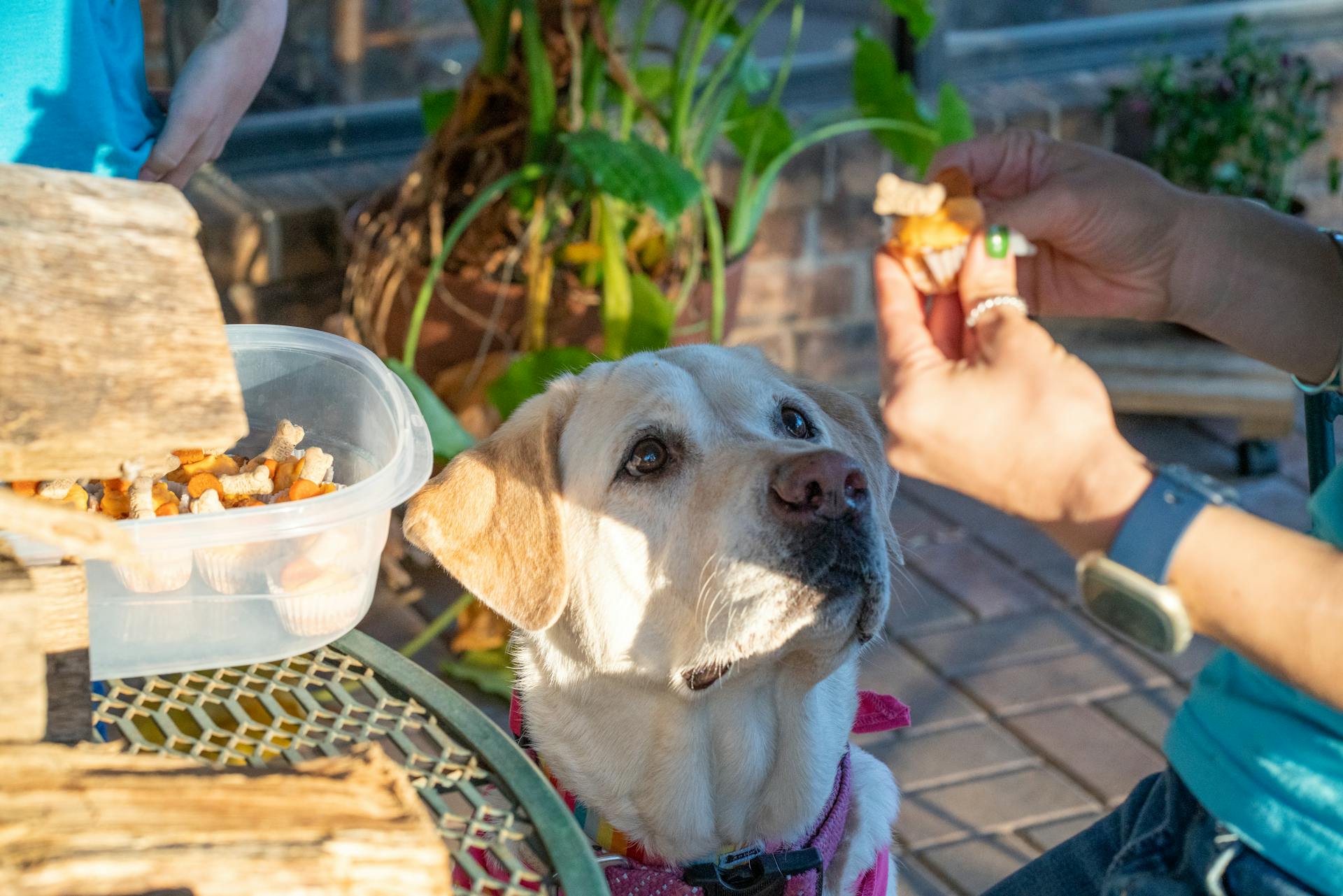
The Dobermann is a breed that thrives on physical and mental stimulation.
They require at least 30 minutes of exercise per day to stay happy and healthy. This can be as simple as a brisk walk around the block or a more intense workout session at the dog park.
Dobermanns are known for their intelligence, making them relatively easy to train with positive reinforcement techniques. They excel in obedience training and can even learn tricks with minimal effort.
Their short coats require minimal grooming, but regular nail trimming and ear cleaning are still necessary to keep your Dobermann looking and feeling its best.
Personality
Dobermans are known for their intelligent and loyal nature. They're highly trainable, which makes them excel in obedience training, agility, and other canine sports.
Their protective instincts make them great guard dogs, with an imposing presence that serves as a deterrent to potential intruders. Doberman Pinschers have been used in police work, search and rescue missions, therapy work, and as loyal companions.
Related reading: What Is the Most Loyal Dog
These dogs require regular exercise and mental stimulation to stay happy and healthy. Daily walks, playtime, and interactive toys are essential for their well-being.
Here's a quick rundown of the characteristics you can expect from a Doberman:
- Temperament: Intelligent, loyal, and alert
- Exercise Needs: High; they're active dogs that require regular exercise and mental stimulation
- Training: Highly trainable and eager to please
- Grooming: Low maintenance due to their short coat
Their strong bond with their families is one of the most notable aspects of a Doberman's personality. They form close relationships with their owners, which can make them great companions for active families or individuals.
Remember, Dobermans have high energy levels and require regular exercise and mental stimulation to stay happy and healthy. This means they need daily walks, playtime, and interactive toys to keep them engaged.
Health and Nutrition
Dobermans have specific dietary needs to stay healthy and strong. They require easily digestible protein for their muscles, including their heart.
Their diet should also include omega-3 fatty acids (DHA/EPA), which support healthy skin, coat, kidneys, and heart. These natural anti-inflammatories can be added to your Doberman's food under the guidance of a veterinarian.
Some potential health issues in Dobermans include inherited conditions like Von Willebrand’s Disease, hip dysplasia, and Progressive Retinal Atrophy (PRA). Regular check-ups with a vet can help monitor their overall health and catch any problems early on.
Dog Nutrition
Feeding your Doberman Pinscher a complete and balanced diet is crucial for their overall health.
You can achieve this by feeding commercial kibble or wet food approved by the Association of American Feed Control Officials (AAFCO). These foods provide easily digestible protein that supports healthy muscles, including the heart.
Inclusion of omega-3 fatty acids (DHA/EPA) in your Doberman's diet is also beneficial. These act as natural anti-inflammatories and help to support the skin, coat, kidneys, joints, and heart.
It's essential to talk with your veterinarian about adding omega-3 fatty acids to your Doberman's diet, especially if they have joint issues or hip dysplasia. Your vet can recommend the best course of action for supplements.
To reduce the risk of GDV or bloat, feed your Doberman dog two meals per day instead of one larger meal. This simple change can make a big difference in their digestive health.
Doberman Pinscher puppies need to eat more frequently, at least three meals every day.
Recommended read: German Shorthaired Pointer Feeding Chart
What About Allergies?
Allergies can be a challenge for some Dobermanns. Environment and seasonal allergies are common triggers.
Some dogs react to certain chemicals found in household cleaning products, which can exacerbate allergy symptoms. It's essential to identify these triggers to make your dog feel more comfortable.
Seasonal allergies include pollen and grasses as primary culprits. This can lead to discomfort for your dog during peak pollen seasons.
Food allergies are another concern, particularly with certain meats and cereals used in commercial dog food. Identifying the specific allergen can be crucial in developing a treatment plan.
Here are some common allergy triggers:
- Environment
- Certain chemicals in household cleaning products
- Seasonal allergies (pollen, grasses)
- Food (certain meats, cereals)
- Tick and flea bites
- Dust mites
- Mould
Care and Maintenance
The Doberman Pinscher has a short coat, but consistent brushing is necessary to manage shedding.
Daily exercise and mental stimulation are essential for this breed, requiring active pet parents who can keep up with their energy levels. They thrive on training and socialization, which helps them grow into well-adjusted adult dogs.
A securely fenced yard is crucial for the safety of both your Doberman and others, as they have a strong prey drive that needs to be managed. Regular veterinary check-ups are also vital, especially since this breed is predisposed to heart disease.
For another approach, see: Doberman Rhodesian Ridgeback
Spaying/Neutering
Spaying/Neutering is an important aspect of a Dobermann's care and maintenance. A lot of vets prefer to wait until a Dobermann is around 9 months old before spaying or neutering them.
Dogs are more mature at this age, making it easier for them to undergo the procedures. This recommendation can vary depending on individual circumstances, but it's generally considered best practice by many veterinarians.
Other vets recommend spaying and neutering dogs when they are 6 months old, although this is typically only done in non-medical situations. In some cases, medical reasons may necessitate earlier spaying or neutering.
You might like: Bernese Mountain Dog 6 Months
Maintenance
Doberman Pinschers require regular exercise to stay happy and healthy. They need an active lifestyle that keeps them both physically and mentally stimulated.
Consistent brushing is a good idea for Dobermans, as they shed regularly. You should aim to brush their coat daily or a couple of times a week.
To prevent destructive behaviors, it's essential to provide your Doberman with regular physical and mental exercise. Without this, they may seek out their own entertainment, which can lead to unwanted behaviors.

As a responsible pet owner, you must also consider the potential risks associated with your Doberman's strong prey drive. If you have small animals at home, such as guinea pigs or rabbits, it's crucial to socialize and train your Doberman extensively to prevent any harm.
Regular veterinary check-ups are vital for maintaining your Doberman's health. A healthy Doberman should have a physical exam performed by a veterinarian at least once annually, especially since the breed is predisposed to dilated cardiomyopathy, a type of heart disease.
Training and Behavior
Dobermans can be fun and loving family dogs, especially with early socialization. They are usually patient with young children, though their excitable nature means they might accidentally knock very small children over during play.
It's essential to supervise interactions between kids and dogs, no matter the breed, to ensure everyone's safety. Dobermans may also have a strong prey drive, which could lead to chasing small animals, including cats, but with proper introduction, they can live together well.
Dobermanns are highly intelligent and excel at obedience training, making them easy to train if handled correctly. Their training and socialization must start from a young age, as they can be a bit fiery when excited, especially during the early stages of their development.
Behavior
Dobermans can be fun and loving family dogs, especially with early socialization.
Their excitable nature means they might accidentally knock very small children over during play, so all interactions between kids and dogs should be supervised.
Despite their history as a guard dog breed, Dobermans are usually patient with young children.
However, their strong prey drive could lead to chasing small animals, including cats, so introducing them properly is crucial for harmonious coexistence.
Dobermans can live well with cats if introduced correctly, and they're not inherently aggressive towards other pets.
What About Adaptability?
Dobermanns are just as happy living in town as they are in the country providing they are given the correct amount of daily exercise and mental stimulation to prevent boredom from setting in.
They thrive on regular physical activity, so a household with a securely fenced large garden is ideal for them, allowing them to roam freely and really express themselves.
Living in apartments isn't suitable for Dobermanns due to their high energy levels and need for space to move around.
Good Choice for First-Time Owners?
If you're a first-time dog owner, Dobermanns might not be the best fit for you.
They need to be handled and trained by people who are familiar with their specific needs, which can be challenging if you don't have prior experience with high-intelligence breeds like them.
Because of this, they could take on the role of "alpha" dog in a household making them harder to manage and live with.
Dog Feeding Guide
Feeding your Doberman Pinscher is a crucial aspect of their care, and there are some specific guidelines to follow.
Commercial kibble or wet food approved by AAFCO is a good way to ensure your Doberman receives a complete and balanced diet. These dogs need easily digestible protein for healthy muscles, including the heart.
To reduce the risk of GDV or bloat, it's recommended to feed your Doberman two meals per day instead of one larger meal. This will help prevent any potential issues with their digestive system.
Doberman Pinscher puppies require more frequent feeding, at least three meals every day, as they need a lot of energy to grow and develop properly. Avoiding elevated food bowls is also essential in preventing GDV or bloat.
The recommended caloric intake for Doberman Pinschers varies depending on their physical size, metabolism, and activity level, so it's best to consult with your veterinarian about how much to feed your Doberman. This will ensure you're providing the right amount of nutrition for their specific needs.
Buying and Owning a Dobermann
Buying a Dobermann can be a daunting task, but with some knowledge and caution, you can make an informed decision.
Dobermanns are extremely popular breeds, which means there are many amateur breeders who may prioritize profit over welfare. Be wary of online scams where sellers ask for money up front before delivering a puppy to your home.
To avoid falling victim to these scams, never buy a puppy unseen and always visit the pet at the seller's home to confirm their legitimacy. Make sure to take note of their address and verify any paperwork they provide regarding the puppy's lineage, vaccinations, and microchipping.
See what others are reading: German Shorthaired Pointer Free to Good Home
It's also essential to research the breeder and ask questions about the puppy's heritage, especially regarding lines that carry the Z-factor gene, which can lead to health issues. Be aware that some breeders may not prioritize the welfare of their dogs or the breed as a whole.
Here are some key things to consider when buying a Dobermann:
- Ask to see relevant paperwork for the puppy's lineage, vaccinations, and microchipping.
- Verify if the breeder is reputable and prioritizes the welfare of their dogs.
- Be aware of lines that carry the Z-factor gene and ask about them.
Remember, buying a Dobermann is not just about getting a pet; it's also about making sure you're supporting responsible breeding practices.
Price
The cost of buying a Dobermann can range from £1000 to over £2000 for a well-bred pedigree puppy.
You'll need to factor in the cost of insurance, which can be around £48.65 a month for basic cover, but jumps up to £156.54 a month for a lifetime policy.
To keep your Dobermann healthy and happy, you'll also need to budget for food costs, which can range from £40 to £60 a month, depending on the quality of dog food you choose.
Annual veterinary costs can add up quickly, with initial vaccinations and annual boosters costing over £1000 per year.
Expand your knowledge: How Much for a German Shorthaired Pointer
Buying Advice
Buying a Dobermann puppy can be an exciting and rewarding experience, but it's essential to approach with caution and do your research.
Dobermanns are extremely popular breed, which means that well-bred puppies command a lot of money. This also makes them a target for scammers who try to sell you a puppy online at very low prices. Never buy a puppy unseen and never pay a deposit or any other money online to a seller - always visit the pet at the seller's home to confirm they are genuine.
Under Kennel Club rules, a Dobermann dam can only produce 4 litters, and she must be between a certain age to do so. This means that reputable breeders will have paperwork to prove the puppy's lineage, vaccinations, and microchipping. Make sure to ask to see this paperwork before making a purchase.
It's also essential to know that docking or cropping a Dobermann's tail and ears is illegal in the UK, except for working dogs and medical reasons. Prospective owners should always establish that a Dobermann puppy's tail has been legally docked by a qualified vet and see proof of paperwork supporting this.
Here are some key things to ask your breeder:
- Can you show me the relevant paperwork pertaining to the puppy's lineage, vaccinations, and microchipping?
- Has the dam only produced 4 litters or more?
- Is the puppy's tail legally docked by a qualified vet?
- Are there any known lines that carry the Z-factor gene in this litter?
Frequently Asked Questions
Is a Doberman a good family dog?
Yes, a Doberman can be a good family dog if socialized early, but they often form strong bonds with one person in particular.
What is the difference between a Doberman and Doberman Pinscher?
In North America, the breed is known as the Doberman Pinscher, while outside of this region, it's simply called the Dobermann. This difference in name reflects a shift in how the breed is perceived and classified over time.
Will a Doberman Pinscher protect you?
Yes, Doberman Pinschers are natural guard dogs with a strong protective instinct. They will defend their pack and family with loyalty
What two breeds make a Doberman Pinscher?
The Doberman Pinscher is believed to be a cross between the German Pinscher and the Rottweiler. The exact origins are unclear, but these two breeds are thought to be the primary contributors.
Is Doberman Pinscher American?
No, Doberman Pinschers originated in Germany. Their breed was developed by Karl Friedrich Louis Dobermann in Apolda, Germany around 1890.
Featured Images: pexels.com
